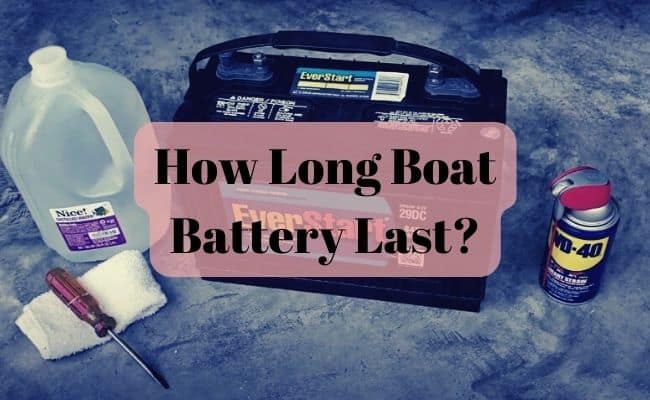There are many factors to consider in determining the life of your boat battery. A deep-cycle marine battery should be charged at least once every two weeks. Likewise, you should avoid leaving the boat running in cold weather unless the engine is fully operational.
A trickle charger can help prolong the life of your battery. Lithium-ion and Gel cells should be charged at least once a month. To make sure that your battery lasts for a long time, you should maintain proper storage and charge the battery once a month.
Some battery types of boats are;
- Deep cycle marine batteries
- Lithium-ion batteries
- Lead-acid batteries
How Long Does a Marine Battery Charge Last?
A Marine battery charge takes an average of 4 hours. The life of a marine battery can be affected by many factors, including the type of trolling motor you use and the temperature of the water. Fortunately, the type of battery you use will also play a role, with lithium-ion batteries having the longest lifespan. Of course, cold weather can reduce the battery’s life. Cold weather decreases the ability of a battery to produce power, reducing its lifespan.
Sealed Lead Acid Batteries
The most important thing to remember when buying a new battery for your boat is that they are not spillable. A typical maintenance-free marine or auto battery is not fully leakproof. That means that the gas in the battery must have somewhere to vent during charging. A sealed lead-acid battery, on the other hand, does not leak or spill and is leak-proof. This makes them ideal for marine applications, where they need to perform at a high level for extended periods.
The battery chemistry in a sealed lead-acid (SLA) battery is similar to that of flooded lead-acid marine batteries, except that a valve is used to regulate the amount of electrolyte in the unit. The valve is used as a safety valve in case of an overcharge or stressful discharge and prevents lead sulfate buildup. However, it is not completely sealed, and the battery must be charged using a battery tender.
AGM and Gel batteries
There are different types of marine batteries. Both AGM and Gel cells have varying charge life spans. AGM batteries last four to seven years, while gel cell batteries only last two to five years. Gel cell batteries, on the other hand, do not require much maintenance other than occasional recharging. During the recharge and maintenance cycles, it is recommended to check the fluid level of the battery.
Gel batteries store their electrolyte in a liquid gel instead of a liquid. They prevent stratification and spilling. However, gel batteries are very fragile and one mistake can ruin the battery forever. Gel batteries are much more expensive than their AGM counterparts, so they should be charged properly. When choosing a marine battery, it is essential to consider the type of battery you have.
How Often Should You Replace a Boat Battery?
If you’re looking to buy a new boat battery, you might be wondering how often you should replace it. A marine battery should last anywhere from three to five years, while Lithium batteries last from eight to ten years. AGM batteries typically last four to seven years and gel cells last two to five years. Here’s a quick guide to battery life.
Marine Batteries Last 3-5 Years
The average marine battery is designed to last from three to five years. Among the main factors that affect its lifespan are the type of battery and the trolling motor. A lithium-ion battery, for example, tends to have a longer life and is more expensive to purchase. Regardless of the type, it is essential to maintain the battery at a lower voltage to keep it running at its peak efficiency. Also, cold temperatures will reduce the battery’s lifespan, as they cannot produce as much power as in warmer weather.
Lithium Batteries Last 8-10 Years
If you plan to spend most of your time at sea, it makes sense to invest in a good quality battery. Lithium-ion batteries are extremely durable and can last for eight to ten years when used properly. For maximum performance, the lithium battery should be discharged at 80% or less and should be recharged to at least 50% capacity. This technology is ideal for marine vessels because of its low failure rate and excellent safety rating.
AGM Batteries Last 4-7 Years
AGM batteries are ideal for boats, RVs, and recreational vehicles. The difference between them and other batteries is the type of electrolyte used. An AGM battery contains sulfuric acid and lead. The sulfuric acid moves to the lead plates when you draw power from the battery, which results in a chemical reaction between the paste on the plates. As the batteries recharge, this process reverses itself and does not cause acid leakage.
Gel Cell Batteries Last 2-5 Years
The life and reliability of marine batteries are of utmost importance. A boat battery can ruin a weekend sail or fishing trip if it fails. And marine batteries are expensive, so the replacement cost can add up quickly. Therefore, you should consider using gel batteries when you are on a boat. However, be sure to keep a few things in mind before choosing one. In this article, we will look at the features of these batteries and what you should know before buying one for your boat.
Wet Cell Batteries Last 2-5 Years
Wet cell boat batteries typically last two to five years with correct maintenance. Regular top-ups of distilled water are required to maintain optimal capacity. AGM batteries can last for up to six years with proper maintenance. Gel-cell batteries can be dangerous to handle and cannot be replaced with distilled water. If you’re considering buying a new battery for your boat, make sure you get one with an extended lifespan.
How Long Do 12V Marine Batteries Last?
To maximize the lifespan of your battery, it’s imperative to clean and maintain it as often as possible. If you don’t, it will not reach its potential. Not cleaning it regularly can lead to sulfate hardening, which can reduce its performance and cause it to overheat. Keeping it clean is crucial, so it’s important to use distilled water to maintain its health.
When it comes to batteries for boats, it’s important to know how long they last. If properly maintained, a 12V marine battery can last between 4 and 5 years. If cared for properly, however, it can last even longer. This article will examine the maintenance steps that you can take to ensure the life of your battery. Also, learn about the difference between marine and automobile batteries. Learn the differences between marine and automotive batteries to understand the life of each.
One of the most important things to remember when it comes to the life of a 12V marine battery is its cycle depth. Different manufacturers have different definitions of “reasonable” discharge depth. Generally, batteries should be discharged no lower than 10 percent. Once discharged to 50%, the battery will last for five years. If the battery is discharged only 10 percent, its lifespan will be reduced to a couple of months.
How Do You Know if Your Boat Battery Is Bad?
How Do You Know if Your Boat Battery is Bad? Here are some steps to take to ensure it’s still working. Use a multimeter and a marine battery tester to check if it’s dead. If you’re not sure what the correct readings are, read on to find out how to check a marine battery and make sure it’s still working.
If your marine battery stops functioning, there are a few steps you can take to determine the cause. Before you perform any testing, make sure to charge the battery 100 percent before testing. This will prevent bad results caused by charge fluctuations. Next, connect the positive wire of your multimeter to the positive terminal of the battery. If the voltage reads 12.6 volts, the battery is fully charged. Otherwise, it’s discharged.
When testing a marine battery, you can use two methods. One method involves applying a load to the battery while monitoring the voltage. A multimeter with a Min/Max function will record the low and high voltages. If the low voltage indicates that the battery needs to be replaced, it’s time to purchase a new one. Another way to determine the battery’s state of charge is to use an electronic test. This type of test checks the cells of the battery through frequency.
How to Extend Boat Battery Life?
A good way to prolong the life of your boat’s batteries is to learn about battery maintenance. A battery’s charge cycle is its full charging and fully discharging process. Marine batteries, on the other hand, are typically partially charged and not completely discharged. This shortens their life, but with proper maintenance, batteries can last for three to six years. Below are some tips for extending the life of your battery.
The first step in extending the life of your boat battery is to properly maintain the connections between your battery and your boat’s engine. Battery connections should always be located in a dry and airtight area, free from fumes and water. If you plan on leaving your boat overnight, it’s a good idea to bring a quality jump starter. Similarly, lead-acid batteries are prone to damage from heat and improper charging.
Another tip for extending the life of your boat battery is to store it properly. Store it in a dry, cool place away from direct sunlight, away from high-heating or freezing temperatures. If possible, keep it warm in a heated room until spring. Regularly recharge your battery, especially in the winter, to prevent the battery from going completely dead.
Never leave your battery in a fully discharged state, as this will reduce its capacity and lifespan. Moreover, be sure to check the terminal connectors on your boat battery as they can loosen and damage their conductivity. Besides, be sure to check the fluid level and add more distilled water if necessary.

